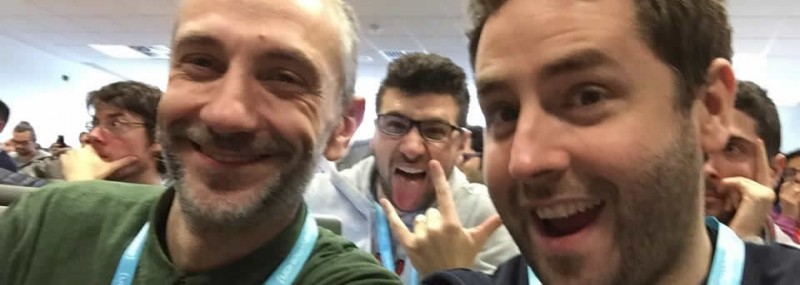Back from Codemotion
I am so happy that I had the opportunity to take part to it, as a speaker and attendee

It’s been two days of big hugs, backslaps and chats at Codemotion Milano: there I had the opportunity to meet a lot of good old friends of WEBdeBS, but also many dear friends and colleagues from all around Italy like Francesco Fullone, Gabriele Lana, Fabio Fabbrucci, Luca Mascaro and many other (sorry if I could not stop by and have a chat with you all).
But it’s been also a two days of great talks and discussions, as I already said on Twitter: it will take weeks to process all the inputs and stimuli I received there.
The thread of these two days (or at least of the talks I attended) was the transformation currently undergoing the world of the software production (development + design), from an amateurish/craftsmanship business to a more mature and self-aware industry.
My talk
Im my speech entitled “What future we want for our Software Industry?” I tried to explain which challenges and risks I foresee as a “senior” developer for the future of our profession. The personal responsibilities that we have towards the future generations.
I pointed out the temptations we have to adopt approaches, processes and mental models typical of the Industrial era, instead of building our own “rules of the game” and decide on which values we want to ground our profession. But most of all the importance of the communities, the open source, the culture of sharing what we know and learn.
I have found the same exact keywords of my presentation – values, passion, responsibility, learning, industry, automation, commodity – in many other talks.
Other interesting talks
Fabio Mora, speaking of a new company model called LiquidO, in which the decisional process based on traditional management is replaced with a more liquid governance, based on a collective intelligence of self-organized (but also high motivated and trained) developers.
In some way Francesco Fullone, telling the story of how he (and a few others) transformed an ordinary community of developers in a nation-wide complex ecosystem of local self-organised groups supported by a central “management” team. All of this using a classic lean approach (“Do, Measure, Repeat”).
Then Gabriele Lana, whose presentation had so many points in common with mine that in some way I even spoiled some of his slides. In his talk he explained how the impostor’s syndrome on one side, and an unconditional passion for our job on the other, can be deleterious for our work and our social status inside a company.
Francesco Cirillo the day after, in a very opinionated and provoking talk, presented a new way of approaching the software development, using a very powerful metaphor: a pastry shop can prepare its cakes recombining existing basic ingredients like sugar, eggs, chocolate, flour, and following a well defined recipe, without every time starting from scratch; and deliver the cake you need for your birthday for the date you need, in the quantity you need, with all the “features” you required when you ordered it. Why can’t our industry do the same? Why do we start from scratch every time someone ask us a new product or a new feature? Isn’t this one a very costly and wasteful way to develop software? For how long can we – as an industry – afford to be so inefficient? Which at the end is in some way the same question I raised in my talk, with the parallel between automotive and software industry.
Unfortunately I could not attend Luca Mascaro presentation, because I had a plane to catch (sorry, mate) but we spoke a little while after lunch, and he told me what kind of project they are following now and how his work is shifting from being a designer of the user’s experience to being a designer of an entire company business relation with their customers. Again, the topic of his talk was the strong transformation (in other words, “maturity”) that his company – Sketchin – is undergoing in order to respond better to the (other) industries requests and necessities.
As you can see, the topic of the moment are the relationship between management and developers, on one side, and the great transformations that our work is experiencing, due to the fact that now our work has a direct an measurable impact on a business success or failure, and this means we are required to be accountable – and so responsible – for what we do and how we do it.
Thanks
Before closing this post, I want to thank again Codemotion for giving me the chance to present this talk, and give my kudos & props to Mara Marzocchi – the woman behind it. If Codemotion has become such an international happening, it’s mainly thanks to her. Soo… brava Mara!
Link: https://speakerdeck.com/didoo/what-future-we-want-for-our-software-industry